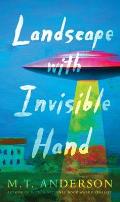Choice Bits from M. T. Anderson
Entertainment Weekly’s interview with M. T. Anderson about his new novella, Landscape with Invisible Hand, focused on its timeliness and political overtones—which came as a surprise to the author. Here are some of his remarks, insightful as always:
I wrote the first version of it like four years ago at this point. Supposedly I had no idea what this political climate was. There is a health care element — like this kid has this weird disease, somehow alien-inspired disease, and his health care won’t cover it. And at the time I actually remember thinking “Oh, with the ACA going into effect, by the time this is published I bet that this will seem kind of backwards.” Like it would seem like a throwback. . . .In an alternate universe, as the kids say, we’d still be talking about dystopian, apocalyptic near-future science fiction that way.
I think that the tension that was probably there in my mind — that I was expressing — was after the 2008 crash, suddenly a couple of years later, everyone is saying, “Look, the economy’s doing great!” But of course, the “economy” — that did not extend to about 95 percent of the population; 95 percent of the population was still in a horrible state. I didn’t think of this as I did it, but then it was immediately clear later: Even the fact that the wealthy now, literally, there is space between them and the rest of the population in this book because the wealthy are now hovering in aerial condos a mile above the Earth’s surface, with access to all this vuvv tech and all this alien tech and all this alien medicine and everything else, while the rest of us are falling around on Earth still. That is, in a sense, I feel also a great representation of how it feels right now. Kind of like a gap between that upper one percent and the rest of us. . . .
If you had talked to people 10 years ago to say that their book was somehow relevant to specific political events, it seemed really kind of embarrassing. It felt like that was a cop-out somehow. . . . there was a phase where dystopian fiction was in but it did not yet have that feeling of complete urgency, except for stuff like Cormac McCarthy. It was a little bit more fun window-dressing to suggest teen angst than it was about a truly political situation in some ways.



No comments:
Post a Comment